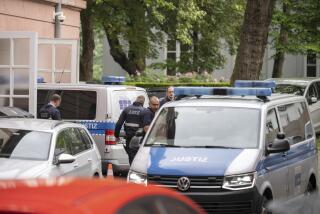German Trial Promises a Look Into the Nuclear Black Market
- Share via
BERLIN — A German engineer accused of belonging to a worldwide nuclear smuggling network went on trial Friday for allegedly providing technology to Libya that could have been used to enrich uranium for weapons.
The case, being heard in a Mannheim court, is expected to offer a glimpse of the nuclear black market once masterminded by Pakistani scientist Abdul Qadeer Khan. The trial is likely to focus on Western intelligence information, middlemen, money trails and what role German companies may have played in aiding leaders such as Libyan ruler Moammar Kadafi.
Gotthard Lerch, 63, is charged with violating Germany’s weapons control and foreign trade acts. He allegedly was paid $34 million to provide Libya with gas centrifuges and other dual-use technologies.
Lerch had earlier been charged with treason. Prosecutors dropped that charge as part of an agreement with Switzerland, where Lerch had been living, to have him extradited to Germany in 2005.
Lerch has pleaded not guilty. His lawyers argued Friday that they had been denied access to prosecution documents, and they requested that the six judges hearing the case be replaced. Lerch is expected to seek intelligence records from the CIA and other Western spy agencies.
“The trial is hugely important in strengthening international attention to the problem of illegal proliferation,” Goetz Neuneck of the Institute for Peace Research and Security Policy at the University of Hamburg told German radio. “It would be very good for international nonproliferation if the trial were to provide more details and shine more light on dark corners.”
Authorities focused on Lerch after the U.S. and Britain seized a shipment of nuclear-related components from a Libya-bound freighter in October 2003. Under Western pressure to abandon its quest for weapons of mass destruction, Libya cooperated with investigators. The seizure also provided details of Khan’s dealings with other countries, including North Korea and Iran.
The International Atomic Energy Agency, the United Nations’ nuclear watchdog, told German prosecutors that Lerch was involved in supplying technology to Libya. He was also mentioned in a Malaysian investigation of smuggling.
The Times reported last year that an IAEA investigator had found that rotors for an advanced centrifuge were delivered for the Libyan project to Khan’s operations in Dubai.
The alleged sale of such technology led to Lerch’s arrest. Investigators fear that other crucial components collected by the Khan network never arrived in Libya and may have been diverted to another country. The father of Pakistan’s nuclear program, Khan was humiliated when he confessed in 2004 that his black market had provided technology to Libya and Iran. He is under house arrest.
In the late 1970s, Lerch, working for a German company that produced nuclear technology, was investigated by German trade authorities for selling centrifuges and pumps to Pakistan. He was never charged. He was also investigated, but again never charged, for allegedly smuggling nuclear blueprints into Switzerland in the 1980s.
More to Read
Sign up for Essential California
The most important California stories and recommendations in your inbox every morning.
You may occasionally receive promotional content from the Los Angeles Times.













